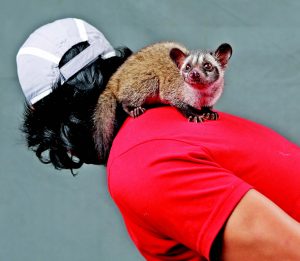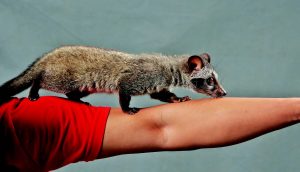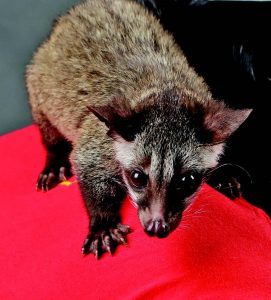Asian Palm Civet Basics
The Asian palm civet, also known as the “musang” or “alamid,” is a solitary animal which prefers to be alone instead of living near other civets. Civets are very intelligent animals that can become accustomed to daily human interaction. They are very playful and curious. Having a pet civet is a unique experience compared to your average pet dog or cat.
It is a great escape artist, easily learning how to open its cage after only a few attempts and able to repeat it when necessary. Civets also like being stroked and their fur is thick and irregular. They have claws for climbing, but as pets, they can get used to regular grooming and nail-trimming. Civets are sweet smelling creatures and they also use this scent to communicate with other civets or ward off potential predators.
Asian palm civets can do well with other indoor pets if properly introduced. Having an Asian palm civet is a long-term commitment; they can live for up to 25 years in captivity in contrast to their wild counterparts, whose lifespans range from just 15 to 20 years.
In the Philippines, Asian palm civets can be legally kept as pets provided that they are captive bred in Department of Environment and Natural Resources (DENR) registered facilities and have the supporting legal documents.
While there is some controversy over the production methods used for “Kopi Luwak” or “Kapeng Alamid,” the berries of which are fermented in the droppings of the Asian Palm civet, the creature itself is worth a second look.
It is is often active at night and mostly prefers higher ground in the forests. Dwelling in trees, Asian palm civets are able to select and eat the ripest fruits in the area.
Asian palm civets were originally thought of as pests in human property as they raided fruit plantations at night, particularly coffee farms. But later, as demand for the coffee made from the berries in their droppings grew, people began to care for them as well (although this is another point of controversy when it comes to the Asian palm civet, as there will always be cruel and unkind keepers concerned solely with profit).
However, Asian palm civets don’t thrive on a diet of coffee berries alone. Being exclusively fed coffee berries on irresponsibly and unethically run farms is the dark side of the production of its expensive coffee.
Where They’re Home
Asian palm civets can thrive in a wide range of temperate and tropical habitats throughout most areas in Asia and its neighboring regions. They can easily adapt to changes in their environment. Their natural habitat covers most parts of Southeast Asia, Bhutan, Afghanistan, and Bangladesh. They are also present in the Philippines and Sri Lanka. However, whether they are native to these latter two locations or were introduced by humans in earlier years is unknown.
The Asian palm civet often lives in hollowed trees or tight spaces in the forest amid forest debris, where they rest during the day and hunt by night. When the food supply is plentiful in an area, the civet will come back to the same territory, which is also where they will breed. The civet is a great climber with above average speed that enables them to escape larger predators by climbing tall trees. There are several other species of civets and in the Philippines, the Asian palm civet is the most common.
Feeding Time
Asian palm civets are opportunistic omnivores; as long as it looks like food for them, they will probably eat it. They mainly eat sweet tropical fruits, some vegetables, and sap from the flowers of sugar palm trees—hence their names.
Civets will also munch on insects, smaller mammals, worms, birds, seeds, reptiles, amphibians, snails, and more. Not just that, this civet can even eat mildly venomous Asian forest scorpions! At times, these civets can be found in urban gardens, plantations, and orchards; they are seldom afraid of human encounters as they continuously look for food.
Are They Important To Us?
The Asian palm civet releases a sweet-smelling scent from glands near their anus. This extract, called civet oil, is used until today for expensive perfumes to make the scent last longer.
Humans have also found that civets are beneficial pest control animals as they hunt pest rodents such as rats and mice, helping prevent the loss of certain farmed crops.
It is even eaten by humans in some parts of the world, being sold as a premium delicacy in restaurants.
This appeared in Animal Scene magazine’s March 2018 issue.







